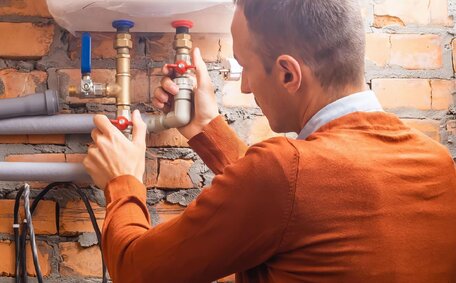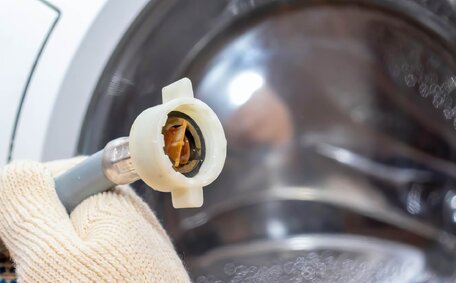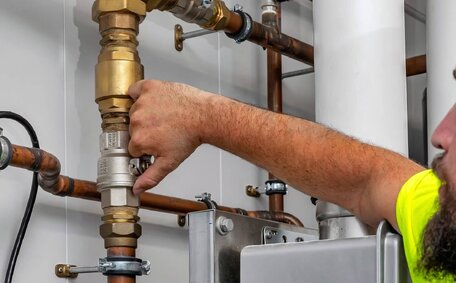Introduction - The Vinegar and Baking Soda Reaction
Many household cleaners rely on chemical reactions between ingredients to boost cleaning power. A widely known example is the mixture of baking soda and vinegar, which generates a notable foaming effect. But does this classic kitchen mixture actually clean better than using either ingredient on its own?
At Saint Marys Plumbing, we have over 10 years of experience providing expert plumbing services, including dealing with boiling water systems for homes and businesses across Saint Marys, Sydney. From drain blockages to hot water system repairs, our fully licenced technicians are well set up and have seen more than firsthand what works and what doesn’t when it comes to household cleaning.
In this article, we’ll break down the science behind these two ingredients, namely baking soda and vinegar, and weigh up whether teaming them is an effective cleaning strategy or purely aesthetic. Read on to figure out what cleaning with baking soda involves, so you can make informed choices when tackling limescale, grease, and other grime around your home.
Effectiveness of Vinegar and Baking Soda When Used Separately vs. Combined
Individually, both white vinegar and baking soda serve as potent cleaning agents. Discover how using white vinegar, which has an acidic pH of around 2-3, in combination with a tablespoon of baking soda can enhance your cleaning mixes. This acidity helps dissolve mineral deposits, remove grease, and kill mould and bacteria.
Find out about baking soda: sodium bicarbonate is one of these two substances with a high pH of 8-9, making it useful for neutralising odours and lifting dirt and stains.
However, when you combine two cleaning powerhouses, an acid-base reaction occurs, producing carbon dioxide gas, water, and sodium acetate (a salt). This reaction creates carbonic acid which quickly breaks down into carbon dioxide gas and water, further neutralising the mixture.
While the foaming action of the baking soda and vinegar can even help lift some dirt, baking soda can help with cleaning, although this mixture’s power is relatively low. Separately using baking soda or vinegar can lead to more effective cleaning outcomes, each capitalising on their distinct pH levels.
For effectively addressing limescale, grease, mould, and odours, including in your toilet bowl, consider using vinegar’s acidic properties or baking soda’s alkalinity - each powerful on its own. Alternatively, for tasks where soda your main ingredient, such as using vinegar to clean toilet surfaces, you can then enjoy the reaction’s foaming effect to lift surface grime before it neutralises.
Practical Cleaning Applications and Limitations of Vinegar and Baking Soda
When used separately, Vinegar and a few tablespoons of baking soda support each other, offering even more practical cleaning applications in the home:
- Vinegar excels at descaling limescale in kettles and removing hard water stains on showers, taps, and sinks. The acetic acid in vinegar cuts through mineral deposits and soap scum effectively when used as a cleaning solution.
- Use one tablespoon baking soda (alkaline), or more vinegar (acidic), as they both absorb tough odours inside fridges, bins, and carpets. You can sprinkle baking soda over upholstery and mattresses to freshen them up.
While the initial foaming action of vinegar and baking soda can mechanically lift some dirt, they lose cleaning efficacy upon neutralisation. Remember that the post-reaction mixture essentially becomes salt water, losing the ability to dissolve limescale, cut through grease, or eliminate bad odours compared to when vinegar or baking soda are used individually.
In particular, avoid using mixtures where soda vinegar can interact for the following ineffective applications:
- Cleaning drains or plumbing fixtures - the foaming action suggests blockage removal but leads to accumulation of abrasive salt residue.
- Removing stains as with laundry detergent - neutralisation prevents vinegar or baking soda individually lifting stains.
- Descaling dishwashers or using baking soda in your washing machine - salt residue from the reaction can accumulate causing maintenance issues.
For optimal results, employ baking soda and vinegar each in their own capacities to harness their true cleaning potential. For more insights and check out specialised plumbing cleaning applications for your home, contact our team of licenced technicians at Saint Marys Plumbing today.
Using Vinegar or Baking Soda Alone for Best Results
To truly harness the full cleaning potential of baking soda and vinegar, it’s advisable to use them independently for specific applications:
Cleaning with Vinegar
- Hard water stains – Apply and add cup baking soda to clean with a cloth soaked in undiluted white vinegar to quickly rub away from taps, shower head fixtures and water fixtures. Wipe down agitated areas after letting them sit for a few minutes before rinsing clean.
- Grime on tiles - For efficient cleaning, mix equal parts of vinegar and warm water, add to a spray bottle, and use it directly without baking soda. Then spray vinegar, letting it can help loosen the grime on tiles, wait several minutes and wipe away using a soft cloth.
- Mould removal - Pour vinegar into spray bottle undiluted and then spray directly onto mouldy areas of bathrooms. Get rid of the dirt by letting it sit for 1 hour before scrubbing and rinsing away.
Cleaning with Baking Soda
- Odour removal - Maintain freshness in your fridge, bins, and carpets by liberally sprinkling baking soda over them. Leave for 12-24 hours before vacuuming to lift odours.
- Baking soda also excels at polishing metals – create a paste with 3 parts baking soda to 1 part water. Gently rub the paste baking soda onto copper, silver or stainless steel using a soft cloth and rinse.
- Lifting stains in your laundry’s wash cycle - Mix a half cup baking soda, and add one cup vinegar to help loosen fabric stains, with just enough water to form a paste. Gently dab paste onto fabric stains and let sit for several hours before washing.
Allow our licenced plumbers to make your home more comfortable with extensive plumbing works, blocked drain cleaning or emergency repairs at Saint Marys Plumbing. Contact us today to learn more.
Myths and Misconceptions about Cleaning with Vinegar and Baking Soda
Few household cleaning hacks are as widely acknowledged yet as frequently misinterpreted as the combination of baking soda and vinegar. Despite the foamy chemical reaction hinting at enhanced cleaning power, in practice, it offers limited benefits.
Common myths about using this classic kitchen mixture include:
- The foam "lifts" dirt - While the fizzing reaction in your kitchen does help lift some grime mechanically, the solution itself has very little cleaning power once neutralised.
- It clears drains fast - The bubbly effect often continues in your drain, yet it leaves behind abrasive salt residue without effectively removing clogs.
- It removes stains better - Neutralisation prevents vinegar or baking soda individually lifting stains as acidic and alkaline solutions.
The bottom line - avoid using baking soda and vinegar mixtures for most cleaning tasks. While visually impressive, the chemical reaction neutralises the useful properties of both. For best results, learn how clean vinegar as an acid (for mineral deposits) or baking soda as a base (for odours) can be when used on their own instead.
As licenced plumbers, we have seen firsthand in Saint Marys homes how sodium acetate salt residue from baking soda and vinegar combinations can accumulate over time, causing plumbing maintenance issues.
For specialist drain cleaning or any residential and commercial plumbing emergencies in Saint Marys, Sydney - contact our team at Saint Marys Plumbing today.
When Not to Use Vinegar and Baking Soda
While vinegar and baking soda can be effective cleaners when used properly on their own, there are certain situations when it’s best to avoid using them together or individually:
- Avoid using vinegar on marble or granite as its acidity may etch these materials; however, baking soda is gentle enough to clean these delicate surfaces without inflicting damage.
- On hardwood floors – Both ingredients, especially when baking soda clean methods are applied, can strip protective finishes, dull wood and leave behind residue.
- In jewellery cleaning – Chemical reactions can corrode precious metals, dull stones and erase hallmarks.
- On electronics or appliances – Potential electrical shorts plus corrosion from salt residue.
- In drains already clogged with hair or debris – The foaming reaction suggests clearing blockages but leaves abrasive build-up.
At Saint Marys Plumbing, we recommend against DIY drain cleaning fixes like vinegar and baking soda. For specialist drain unblocking services or any other residential and commercial plumbing emergencies in Saint Marys, Sydney, contact our team of licenced technicians today.
Alternative Natural Cleaning Solutions
While the baking soda and vinegar reaction has visual appeal, its practical cleaning ability is limited. Thankfully, there are several alternative natural solutions for effective cleaning around your Saint Marys home:
Lemon Juice
Lemon juice’s acidity is effective at dissolving mineral deposits, bleaching stains, and slicing through grease. Use your lemon juice to descale kettles, brighten countertops, or tackle tough stains in your kitchen sink and on benches and outdoor furniture.
Hydrogen Peroxide
A mild bleach, hydrogen peroxide eliminates mould and bacteria while whitening surfaces. Clean and disinfect sinks, tiles and shower grouting by allowing it to sit for 10 minutes before rinsing.
Salt
Like baking soda, table salt absorbs odours and lifts stains, proving particularly useful for cleaning stoves and ovens. Alternatively, just use only baking soda sprinkled on carpets overnight before vacuuming, or make a cup baking soda paste cleaner for scrubbing sooty oven doors back to sparkling.
For extensive plumbing repairs, replacements or cleaning services, Saint Marys Plumbing's fully licenced technicians can help residential and commercial customers in Saint Marys and surrounding suburbs. Contact us today.
Optimizing Household Cleaning with Vinegar, Baking Soda, and Other Natural Ingredients
It becomes apparent that while baking soda and vinegar together create an impressive visual effect, their separate use as cleaning agents achieves superior results in your home. The key is matching the right natural ingredient to each cleaning task.
This guide has been created to effectively leverage the cleaning power of common household substances such as baking soda and vinegar:
For extensive plumbing repairs or cleaning services, let Saint Marys Plumbing’s licenced technicians sit with the problem for a few moments and they can restore your residential or commercial plumbing systems to optimal condition. Contact us today.






